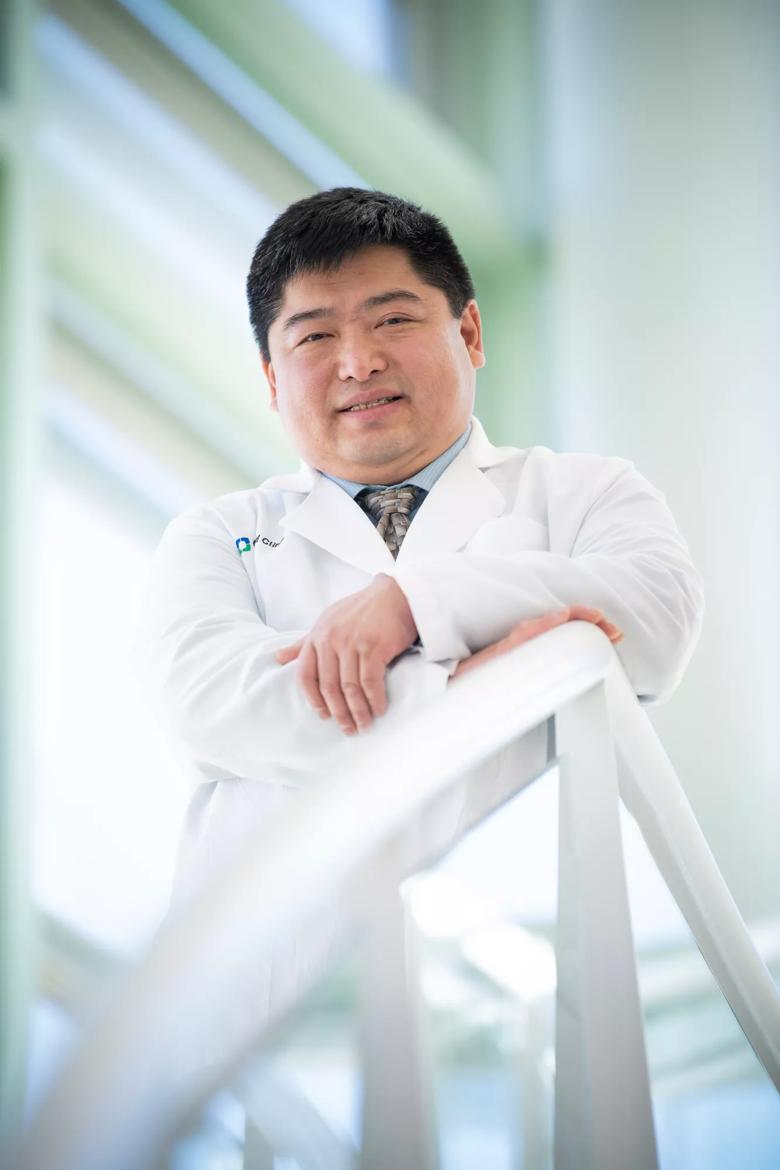Precision cancer medicine is the goal of a new multidisciplinary team examining radiation therapy combined with immunotherapy

Cleveland Clinic received a $7.9 million five-year grant from the National Cancer Institute at the National Institutes of Health to form one of three national centers as part of the newly established Radiation Oncology-Biology Integration Network (ROBIN).

Image content: This image is available to view online.
View image online (https://assets.clevelandclinic.org/transform/a835c578-a001-4a45-b379-8c42c2f1cb99/Chan-Tim_jpg)
Timothy Chan, M.D., Ph.D.
Timothy Chan, M.D., Ph.D., Chair of the Center for Immunotherapy and Precision Immuno-Oncology, will serve as the primary investigator of Cleveland Clinic’s ROBIN center, which will investigate the molecular mechanisms and biology of radiation therapy response and treatment efficacy of radiation and immunotherapy combinations for cancers of the bladder and head and neck.
“Radiation therapy is a bedrock of cancer treatment, with about two out of every three patients with cancer receiving it,” said Dr. Chan. “Yet, despite its widespread use, our understanding of the molecular mechanisms and biology of response to radiation remains poor. The ROBIN center will enable us to develop more effective radiation and immunotherapy combinations and better understand how these approaches work.”
In collaboration with Emory University, Cleveland Clinic researchers and clinicians will lead the studies with the goal of developing new cancer treatment approaches by improving understanding of the drivers of efficacy. Specifically, the team will study radiotherapy in combination with antibody-drug conjugates and immune checkpoint inhibitors.
A multidisciplinary team from the fields of radiation oncology, radiation biology and radiation physics research will allow for continuous sharing of information. In addition, the creation of a cross-training workforce development program will help build a pipeline of scientists in radiation biology, radiation physics and clinical radiation oncology.
The ROBIN center will draw upon Cleveland Clinic’s high patient volumes to generate comprehensive molecular data that will provide key information to enable physicians to select the best treatment for each patient.
“Precision cancer medicine is the future of cancer care,” said Dr. Chan. “The ROBIN center harnesses the power of Cleveland Clinic’s translational research strengths and world-class patient care, where we have the ability to continually learn from innovative treatment techniques by bringing findings back to the research lab for further examination, and then sharing our discoveries with clinicians to expand frontiers in patient care.”
Omar Mian, M.D., Ph.D., radiation oncologist at Cleveland Clinic’s Taussig Cancer Institute and researcher at the Lerner Research Institute, and Shilpa Gupta, M.D., Director of the Genitourinary Medical Oncology at Taussig Cancer Institute and Co-Leader of the Genitourinary Oncology Program, will lead one of the molecular characterization trials focusing on the combination of a targeted therapy, sacituzumab, plus radiation, for the treatment of bladder cancer. A cohort of this study also will take place at Cleveland Clinic’s Florida Research and Innovation Center, under the leadership of Anatoly Nikolaev, M.D., Ph.D.
A second clinical trial examining the effectiveness of treating recurrent head and neck cancer with radiation therapy and nivolumab, is being led by Shlomo Koyfman, M.D., a radiation oncologist at the Taussig Cancer Institute.
De-identified patient samples from those receiving the current standard of care and those in the clinical trials will be collected and stored at the Cleveland Clinic BioRepository, a 22,000-square-foot facility on Cleveland Clinic’s main campus that is managed by Azenta Life Sciences and facilitates precision-medicine biobanking through sample collections, transport and integrated tracking.
Dr. Chan’s lab will analyze the samples to generate data using multiple genetic analyses. The breadth and depth of data generated will reveal comprehensive insights into radiation-based cancer treatment strategies. In another of the funded projects in the ROBIN, Jacob Scott, M.D., D.Phil., radiation oncologist and head of the Theory Division in Lerner Research Institute’s Department of Translational Hematology and Oncology Research, will use artificial intelligence to decipher the temporal dynamics of all the complex changes that occur as a result of treatment.
“The ROBIN trial will create the data needed to ultimately drive precision cancer medicine that, in the end, provides the best outcomes for each patient and helps improve quality of life,” said Dr. Chan.
This study is funded in part by study sponsors, Varian and Gilead Sciences, and Brian and Diana Taussig.
Cleveland Clinic is a nonprofit multispecialty academic medical center that integrates clinical and hospital care with research and education. Located in Cleveland, Ohio, it was founded in 1921 by four renowned physicians with a vision of providing outstanding patient care based upon the principles of cooperation, compassion and innovation. Cleveland Clinic has pioneered many medical breakthroughs, including coronary artery bypass surgery and the first face transplant in the United States. Cleveland Clinic is consistently recognized in the U.S. and throughout the world for its expertise and care. Among Cleveland Clinic’s 82,600 employees worldwide are more than 5,786 salaried physicians and researchers, and 20,700 registered nurses and advanced practice providers, representing 140 medical specialties and subspecialties. Cleveland Clinic is a 6,728-bed health system that includes a 173-acre main campus near downtown Cleveland, 23 hospitals, 280 outpatient facilities, including locations in northeast Ohio; Florida; Las Vegas, Nevada; Toronto, Canada; Abu Dhabi, UAE; and London, England. In 2024, there were 15.7 million outpatient encounters, 333,000 hospital admissions and observations, and 320,000 surgeries and procedures throughout Cleveland Clinic’s health system. Patients came for treatment from every state and 112 countries. Visit us at clevelandclinic.org. Follow us at x.com/CleClinicNews. News and resources are available at newsroom.clevelandclinic.org.
Editor’s Note: Cleveland Clinic News Service is available to provide broadcast-quality interviews and B-roll upon request.